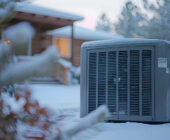
Determining what size air conditioner you need is an important part of any AC installation. If you get a unit that’s too big, you spend unnecessary money. A system that’s too small won’t cool your home correctly. Your AC company should present you with professional recommendations and guidance on this important decision.
Here’s how we come up with the right size for your specific situation – in case you want to do your own research. First, you need to find the BTU (British Thermal Units) requirement for your home. This measurement tells you how powerful the AC has to be to cool the space. There are several factors that help determine the size of a home’s AC and a couple of different methods for calculating the size.
Square Footage
The first and simplest method of calculating the BTUs needed to heat and cool your home is to look at the square footage of your house. You can then use a chart to estimate how many BTUs you need based on a range of square feet. If you don’t have a chart on hand, a general rule is an AC need 20 BTU for every square foot.
It’s important to note that this method should provide an estimate – not an exact number. Square footage is not the only factor that goes into finding the needed size of an AC.
Manual J Calculation
Having a manual J calculation done by a professional is the best way to find the best AC size for your house. It considers many factors, including:
• Climate zone
• Square footage
• Number of people in the space
• Heat-generating appliances
• Insulation
• Sun exposure
• Ductwork
• Amount and type of windows
This calculation will tell you the exact BTU needed for your home’s AC because it considers more than just the size of the space being cooled. To get a professional manual J calculation, have an energy audit done for your home.
Choose a Unit
Once you have your exact BTU calculation, it’s time to work with Champion Home Services to find the right unit for your HVAC installation. Because a manual J calculation gives a specific number, the BTU requirements may be between sizes. Simply pick the bigger size of those options to ensure quality AC for your home.
Remember, however, that bigger isn’t always better. To avoid high energy bills and uneven heating and cooling from an oversized unit, choose the AC size that works best for your BTU requirements.
For more information on AC replacement and installation requirements, contact Champion Home Services today.





